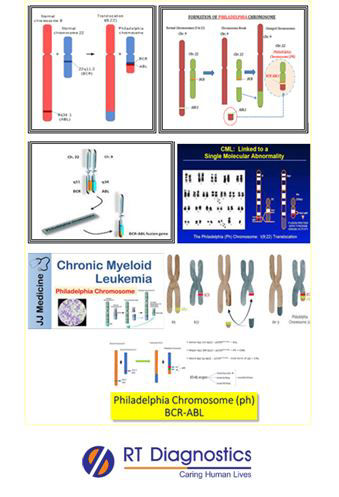BCR-ABL –Philadelphia Chromosome:
Why BCR-ABL – Philadelphia Chromosome test?
CLINICAL INFORMATION :
BCR-ABL – Philadelphia Chromosome test is performed to detect Philadelphia chromosome and BCR-ABL 1 chimeric fusion genes or its transcripts for RNA synthesized from abnormal stretches [fusion of two long arms of chromosome t(9;22)] of DNA due to genetic mutation on these specific chromosomes i.e 9 and 22 break (P210 v/s P190 breakpoint - cluster region) and switch places (reciprocal translocation). This mutation occurs when pieces of chromosome 9 has attached to chromosome 22[t(9;22)(q34;q11)].This abnormal mutated chromosome 22 is called Philadelphia chromosome because it is in this place researches first discovered it. BCR-ABL 1 fusion genes is translated into 210 kD (p210) or 190 kD (p190) BCR-ABL fusion product with significantly enhanced dysregulated tyrosine kinase activity. Thus it show up in patients with certain types of leukemia, cancers of the bone marrow and WBCs. BCR-ABL 1 fusion genes is almost found in all patients with leukemia called myelogenous leukemia or chronic myeloid leukemia (CML). In some cases of acute lymphoblastic leukemia (ALL) and myelogenous leukemia (AML) also this BCR-ABL 1 fusion genes are found involved. Bone marrow aspiration biopsy is needed for the confirmatory studies. Hence the presence of BCR-ABL1 abnormality confirms the clinical diagnosis of all CML cases, Ph+ ALL or Ph Positive ALL cases and in a few AML cases also. Few causes and risk factors are smoking, exposure to radiation or certain chemicals, family history, genetic disorders, Clinical manifestations include fever, chills, persistent fatigue, weakness, frequent or severe infections, weight loss, swollen lymph nodes, enlarged spleen and/or/both liver (hepato-splenomegaly), easy bleeding on bruising, recurrent nose bleeds, seizures, night sweats, headache vomiting, shortness of breath and petechial rashes (red spots on the skin). Other tests include blood tests (complete blood count), bone marrow biopsy, spinal tap (to check for metastasis to brain), imaging studies like CT, MRI and PET Scans etc.

Generalinstructions:
Sample Requirement: Specimen - collected from the bone marrow. Test Preparation: None.
NOTE - Sample for specimen collections may vary based on the patient’s condition / cases according to patient’s presentingcomplaints / signs or symptoms:
SPECIMENREQUIREMENT (Special or Rare Cases) - As instructed and guided by Physician / Clinician / Pathologist / as per Laboratory’s requirements, according to procedures and protocols.
This Multi-Specialty Clinical Referral Laboratory RTDIAGNOSTICS provides precise and accurate tests with an extensive range of testing services to the medical centers to help in the diagnosis and identification of pathology in the test specimens for infectious diseases and also to evaluate the function of organ systems of the patient. It prevents further complications and helps to stabilize and restore health to near normalcy at the earliest without delay.



